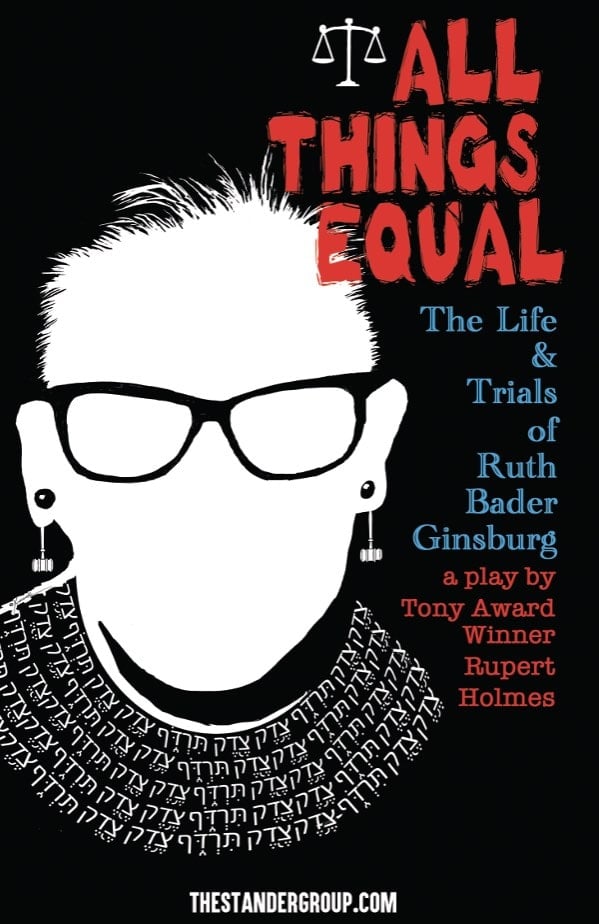The stories of pioneering women have been front and center on DC stages this season: Gloria Estefan in On Your Feet at the Warner Theater in January after premiering at GALA Hispanic Theatre last summer; Gloria Steinem and her diverse cohort of peers and mentors in Gloria: A Life at Theater J in March; and Sister Rosetta Tharpe at Ford’s Theater’s recently closed Shout, Sister, Shout!
On May 19, DC theatergoers will have the chance to spend an intimate evening in the company of Justice Ruth Bader Ginsburg in All Things Equal: The Life & Trials of Ruth Bader Ginsburg. Written by Rupert Holmes (who won Tonys for the book and score of The Mystery of Edwin Drood) and directed by Laley Lippard (who helmed Solas Nua’s 2019 smash hit, The Smuggler), the one-woman play has sold out houses across the country on a 16-city tour. Now, this one-night-only event brings actress Michelle Azar as RBG to U Street’s Lincoln Theatre, a fitting venue for the story of a stalwart defender of democracy, equality, and justice.

DC Theater Arts brought Holmes and Lippard together for a chat about the play’s development, rehearsal, and reception.
DCTA: Where did the idea for All Things Equal come from?
Rupert Holmes: I initially became interested in Ruth Bader Ginsburg’s history because her life in many ways parallels my wife Liza’s. Liza was orphaned in her early teens, graduated from Barnard, and like RBG attended law school while raising our daughter, Wendy. And she became a wonderful defense attorney. That was my kind of camaraderie with her and the many issues she stood for. But when the pandemic stopped theater, I thought if there’s a way to bring theater back it might most realistically be one-actor plays. After the death of Ruth Bader Ginsburg [in September 2020], someone contacted me and asked if I had any interest in writing a play about her. So, I spent a year researching her life, and the more research I did, I started to see her not as an icon or a trope but as a flesh-and-blood person. I became passionate to write about what she did for human rights and her tenacity and what she believed about our judicial system.
Laley, what was your experience reading a draft of this new play?
Laley Lippard: I read this play in June of 2022, when the decision to dismantle 50 years of legal protection for abortion came down. I was at a research institute for social justice and Buddhism in the desert of Santa Fe. I felt powerless in the face of this decision, and so far away from my community in DC. When this play was sent to me, it literally felt like the truth and spirit of this woman was speaking directly to me, in a time of fear, to comfort and rally me. So in the same way Rupert talks about moving forward with theater after the pandemic, this play literally helped me move forward after that decision. We started rehearsals a month or so later, and I became even more passionate about how necessary this play is, how it speaks to an intergenerational, intercultural audience.

Holmes: I was very aware that I was a man writing about one of the great women of our country’s history. It was clear in my mind when working on this piece that a woman would direct it. I was grateful to turn this play over to Laley, who then in turn shared it with Michelle [Azar]. I got the chance to hear from them about what they were learning about the play because of their own life experiences and theatrical sensibilities.
Can you share a little more about the play’s development through the rehearsal process?
Holmes: Just as you get daily reports from a stage manager about how performances were going, I got from Laley daily insights and discoveries that she made with Michelle. I don’t think there were any huge changes. I think it was adjustments, modifications. Things to flesh out that had seemed secondary.
Lippard: The piece was comprehensive and the basic structure was there. And it was funny. Rupert really captured the wicked, self-effacing, joyful, and slicing wit of Ruth Bader Ginsburg. There are brilliant jokes throughout, and it was amazing when Michelle would improvise something and we’d go back and forth as we all learned from one another and learned this woman and learned Michelle’s amazing interpretation of this woman. There were many times Michelle and I were in the room when it felt like Ruth spoke in rehearsal, demanding certain topics be covered, for certain rhythms, for ideas to be more emotionally resonant.
Holmes: Laley says I came up with lots of funny things, but interestingly enough, it’s not a comedy. The audience laughs throughout the show. Ruth has trials that she gets through with sly maneuvers, and we get to laugh with her conspiratorially, “Aren’t we devils?” But Ruth wrote those funny things. I began to hear her. I cannot have music playing in the background [when writing] because it interferes with the music in the pages. And at Bay Street, a wonderful theater in Sag Harbor [where the play premiered], seeing Michelle working with the audience helped. Once you see your play with an audience you learn 1,000 times more than you knew about it in the year or two you took developing it. It was great. It was wonderful to have Ruth’s voice and Laley’s prism and Michelle’s own responses to living as the character.
Speaking of audiences, the show has been playing to sold-out houses and getting great reviews. What do you think of the reception it’s getting?

Lippard: I have never sat in an audience where people have responded as consistently throughout a play. They talk to her, answer her questions, talk to one another about what is happening on stage. It feels like a conversation, powerful and alive. And Michelle has so captured the spirit, and quite literally looks like Ruth Bader Ginsburg, that when the lights come up at top of show, the audience often gasps. It has been magic every time I’ve seen that.
Holmes: I agree totally. It’s remarkable. In All Things Equal, it’s as if the audience is having an audience with Ruth Bader Ginsburg. It’s a communion, right from the outset. The audience feels like they have the chance to have an intimate, comfortable, relaxed conversation with her. I see a play that makes people laugh, yet also get emotional. They get angry, but not at her. And they get to celebrate Ruth Bader Ginsburg and her triumphs.
One last question—what does it mean to the two of you to have this show come to DC, with its unique connection to Justice Ginsburg?
Holmes: Many of the highlights of my career have taken place in Washington, DC. I performed at the Cellar Door, my first time headlining. At the Kennedy Center Opera House, I saw George Rose, who won the Best Actor Tony for The Mystery of Edwin Drood, in the last time he performed the role. George Bush Sr. attended my play Solitary Confinement, also at the Kennedy Center. I performed for the Library of Congress. I was Laura Bush’s guest as a novelist. And many theater companies have done outstanding productions of my thrillers. So, in every aspect of my career, being in DC kind of let me know I was doing something of note. It means a great deal to me.
Lippard: I went to undergrad here in DC, so it was an original artistic home and development space for me. I’ve worked with a number of companies here: Rorschach, Woolly Mammoth, Arena Stage, the Kennedy Center, the Welders, Solas Nua, and others. I’ve found an incredible community here. To have had a play go across the country and for its final stop to arrive not only at my current home but Ruth’s home feels like the closing of a circle and the launch into the next wave of this play, wherever it goes. To be here, in the seat of our government, at the intersection of civic justice and theater, with what this play says about humanity, equality, equity, representation—and the demand for those embedded in Ruth’s life and work—is professionally and personally deeply meaningful.
All Things Equal: The Life and Trials of Ruth Bader Ginsburg plays May 19, 2023, presented by Scott Stander performing at the Lincoln Theatre, 1215 U Street NW, Washington, DC. Tickets ($35–$50) are available online.
Running Time: 90 minutes with no intermission.
The program for All Things Equal: The Life and Trials of Ruth Bader Ginsburg is online here.
A study guide for the production is online here.
COVID safety measures in place at the Lincoln Theatre: “We are following local COVID guidelines in place for each of our venue locations. If a performer decides that they would like a more stringent policy in place for their show, we will follow their lead. Individual show policies will be posted on our website and communicated to ticket holders ahead of the show.”





